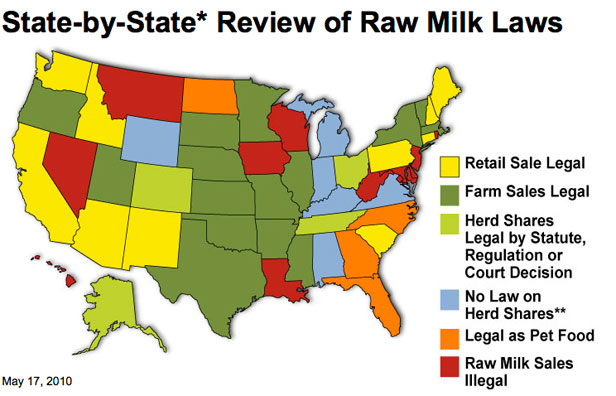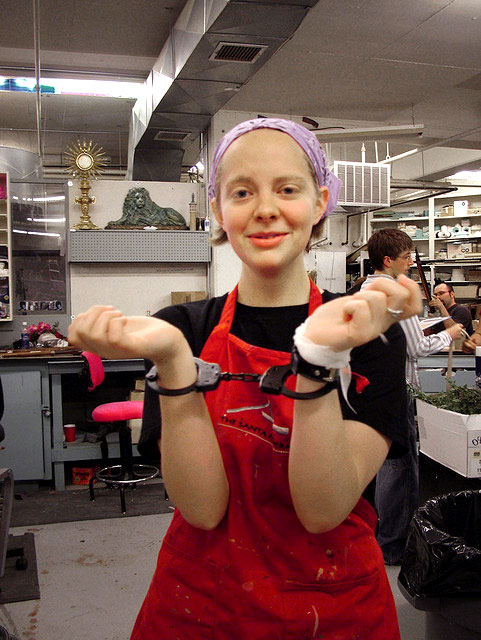 *Other forms of unpasteurized milk distribution may also be allowed in any particular state. **There is no law either legalizing or prohibiting herd shares. State is aware herd share programs currently exist and has taken no action to try to stop them.Map courtesy of Farm to Consumer Legal Defense Fund
*Other forms of unpasteurized milk distribution may also be allowed in any particular state. **There is no law either legalizing or prohibiting herd shares. State is aware herd share programs currently exist and has taken no action to try to stop them.Map courtesy of Farm to Consumer Legal Defense Fund
Resistance has a glorified history in this country, beginning with the founding fathers, and extending to the labor and civil rights movements last century. We honor one of the resisters, Dr. Martin Luther King, with a national holiday.
The ranks of food resisters are now expanding rapidly. Driven by increasingly harsh crackdowns by local and federal agencies on small producers and distributors of unpasteurized (raw) milk and other nutrient-dense foods, growing numbers of individuals involved in this part of the food chain are publicly refusing to abide by government edicts and shutdown orders.
But the reality for today’s rebels is far from glorious. Max Kane, the owner of a buying club in Wisconsin that distributes raw milk, is facing jail if his appeal on a contempt of court conviction last December is denied. He had several times refused orders from the Wisconsin Department of Agriculture, Trade, and Consumer Protection to provide information about the farmers who supply his milk and the names of his raw milk customers.
 Raw deal: Are you ready to go to jail for distributing unpasteurized milk?Photo courtesy of eqqman via FlickrJames Stewart, the manager of Rawesome Foods, which was raided June 30 by agents from five federal, state, and local agencies, is facing the possibility that the private food club he helped found five years ago could be demolished and plowed under by the Los Angeles Department of Building and Safety any day. Rawesome was served with a “Substandard Order” last month after it defied a closure order by public health authorities following the raid.
Raw deal: Are you ready to go to jail for distributing unpasteurized milk?Photo courtesy of eqqman via FlickrJames Stewart, the manager of Rawesome Foods, which was raided June 30 by agents from five federal, state, and local agencies, is facing the possibility that the private food club he helped found five years ago could be demolished and plowed under by the Los Angeles Department of Building and Safety any day. Rawesome was served with a “Substandard Order” last month after it defied a closure order by public health authorities following the raid.
Brigitte Ruthman, owner of a 32-acre farm in the Massachusetts Berkshires, could lose her dairy after she was served in August with a cease-and-desist order for running a one-cow herd share serving three shareholders with raw milk, and announced her intention to resist. (For more on creative raw-milk arrangements, see my recent post.)
The point? Resistance is serious stuff all around. What especially concerns the authorities is that most government agencies don’t have the manpower to cope with widespread resistance. So they are becoming ever more aggressive about making examples of those who resist, trying to send the message that flouting official orders is a fool’s course.
That message can be intimidating. “My wife gets a little upset,” says Vernon Hershberger, the Wisconsin dairy owner who, in a show of defiance, cut the seals placed on his farm-store refrigerators in May and has since been hit with two more search warrants.
As more individuals contemplate resistance, it’s important to consider the ramifications. Here are a half-dozen insights I’ve gleaned from speaking with a number of resisters as to what you can expect if you defy the real food police.
1. You will be treated harshly: The sight of agriculture agents escorted by one or two state police vehicles showing up in one’s front yard is an intimidating one for most people. The intent, of course, is to send a grim message to others who may be contemplating a similar action. Sometimes there are ongoing search warrants, as in the case of Vernon Hershberger in Wisconsin. Sometimes there are additional official orders, as in the case of Rawesome in California.
2. Get used to the loneliness: Some individuals who resist expect other farmers to back them, and for consumers to rally to the cause. While consumers have made noise in places like Wisconsin and Massachusetts by phoning local politicians, farmers are often shocked by the lack of support they receive from other farmers. One farmer who spoke out loudly after his raw dairy was shut down told me several neighboring farmers not only didn’t help, but used the event as an excuse to steal customers from him. But even those unaffected farmers who are sympathetic are mostly concerned with making a living so they can keep up on their home and equipment payments.
3. Better have your family on board: There’s little worse than publicly standing up to the authorities then having your spouse tell you shortly afterwards that you were a fool, and that s/he can’t take the pressure. One farmer told me his wife dreads his business trips for fear she’ll have to confront the authorities herself.
4. It is stressful: You should assume you’re being watched a lot, and you never know when the authorities will show up. The authorities will play on the fear and uncertainty most people feel, sometimes keeping a farm under observation, and even waiting till both parents are gone so they can confront the teenage children left in charge and serve a search warrant.
5. Going underground is no panacea: One farmer who stood up in protest decided after a few months to simply do her raw milk business underground, out of public view. But now, each time she gets ready to ship or transport the contraband food items, she feels increasingly nervous: “I’m not naturally a sneak.”
6. Be ready to obtain legal help: Farmers and food distributors are often loath to seek out legal help because it’s so expensive — $300 to $500 an hour isn’t unusual. Based on what I’ve observed, resisters should do whatever they can to get legal assistance. There are too many instances where search warrants are defective in one respect or another — for example, in not giving authorities the right to use force to gain entry to buildings or storage areas. Sometimes, there aren’t even laws on the books covering the authorities’ actions; in Massachusetts, agriculture authorities said “cowshare” arrangements are illegal when issuing a cease-and-desist order to Brigitte Ruthman, yet there are no laws on the books covering cowshares. She has since engaged an attorney to help her counter the case. The Farm-to-Consumer Legal Defense Fund can provide legal input as well.
There’s little doubt that more farmers will stand up to what seems to many uneven enforcement of food-safety laws, which favor factory operations over smaller operations. For example, officials have linked a new strain of E. coli to actual illnesses, reports the New York Times, yet they can’t even force the large meat processors to test whether their meat is tainted with it.
Just understand that the glory days of food resistance haven’t yet arrived.
Grist Get Off Your Ass opportunity: Learn more about the raw-milk resisters through Sandor Katz’s The Revolution Will Not Be Microwaved: Inside America’s Underground Food Movements, Nina Planck’s Real Food, and Gumpert’s own book, The Raw Milk Revolution.



